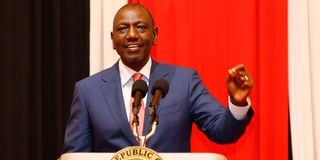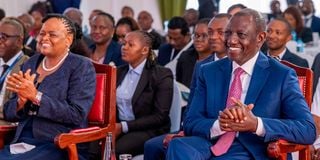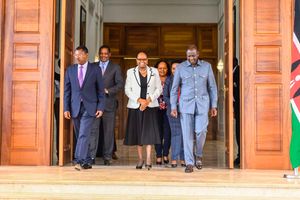
President William Ruto.
President William Ruto has asked the judiciary to desist from interfering with decisions made by other arms of government, renewing his attacks on the courts he has blamed for stalling his administration's policies.
Speaking at the Supreme Court building as the apex court marked 12 years since its establishment, President Ruto said courts should avoid what he called 'judicial overreach' by interfering with the mandate of other arms of government.
Dr Ruto said although the executive can be checked by the courts when it encroaches or interferes with other independent arms of government, it is not clear where Kenyans should go when the judiciary interferes with other arms.
“Just as we restrain ourselves as the executive by not interfering on matters that are on the purview of other arms of government, there is equally high responsibility on the part of the judiciary to restrain itself when it comes to matters before other arms of government,” he said.
Earlier this year, President Ruto attacked the judiciary, saying some corrupt judges were being used by unnamed persons to block projects initiated by his Kenya Kwanza administration.
At one point, Dr Ruto threatened to ignore court orders and proceed with his plans.
Some of the projects, including the Affordable Housing programme, the Universal Health Coverage (UHC), the new digital identification card (Maisha Namba), have been blocked by the courts. The cases are still pending determination.
Chief Justice Martha Koome then threw the ball into Ruto’s court challenging his government to table evidence against the said judges before the Judicial Service Commission (JSC).
“However, such complaints must be lodged and processed in the manner prescribed by the Constitution. The Commission will only act on the basis of evidence and not on blanket statements or allegations that have not been substantiated,” said Justice Koome.

Chief Justice Martha Koome and President William Ruto during the commemoration of the 12 years since the establishment of the Supreme Court, at the Supreme Court Building in Nairobi County on November 4, 2024.
President Ruto wondered how a government is expected to fulfil its mandate if the projects contained in the party manifesto are struck down by the courts.
“What happens to a programme contained in a manifesto that has been endorsed by millions of Kenyans alongside a candidate and a party?” he asked.
Dr Ruto said that as a politician he has to strike a balance between being popular and doing the right thing. But when he sacrifices populism to do the right thing, courts “decide to be popular and undermine his agenda”.
“I want to invite the court to think about it,” Dr Ruto said.
President Ruto said that to appreciate the achievement represented by the creation of the Supreme Court, Kenyans must revisit the hard lessons of the 2007 presidential election crisis.
He said the 2007-08 crisis exposed deep-seated systemic failures and a profound erosion of public trust in Kenya's electoral and judicial processes, fracturing the people’s faith in the rule of law.
“Consequently, a disputed election outcome triggered underlying conflicts that nearly drove the nation to the brink of total collapse,” he said.
Chief Justice Martha Koome called on politicians to resolve political problems politically before resorting to the courts.
The CJ said it was important that political institutions exhaust all political solutions and only resort to the courts as a last resort.
According to Justice Koome, when courts are asked to deal with political issues of a legal nature, there is an inevitable risk of being drawn into perceptions that plague the political game.
She said the formation of the broad-based government after the disputed 2022 elections was proof that political solutions to political problems were possible.
“Although courts remain ready to delve into complex legal issues arising out of political processes, we must require all institutions to exhaust constitutional alternative dispute resolution avenues to strengthen the cohesion in our society,” the CJ said.
The CJ said the 12-year existence of the Supreme Court, has shown that despite the principle of separation of powers and the need for checks and balances, cooperation between the organs of the government and among state institutions was necessary and desirable for the promotion of national interest and constitutionalism.
“Effective collaboration in the national interest is vital to the realisation of the Constitution's transformative vision. No single institution or organ is entire of itself or viable in isolation,” she said.
The event was attended by Deputy President Prof Kithure Kindiki, former Chief Justices Willy Mutunga and David Maraga, Supreme Court judges, Prime Cabinet Secretary Musalia Mudavadi, Attorney-General Dorcas Oduor, among others.










